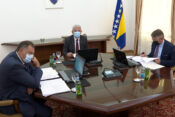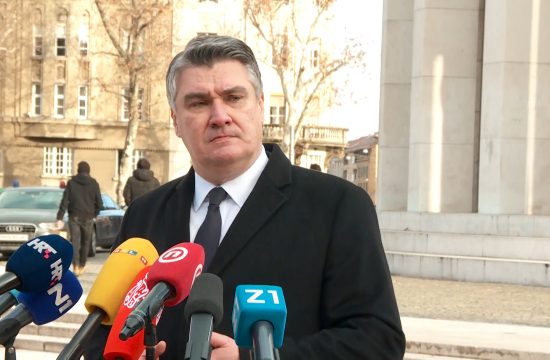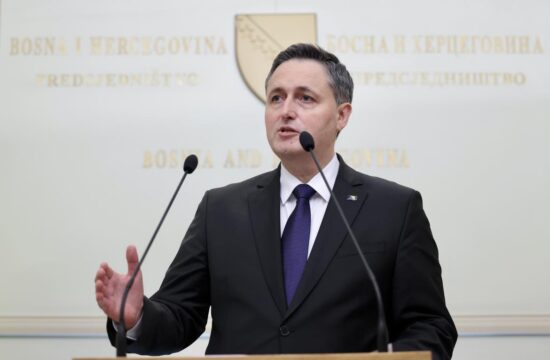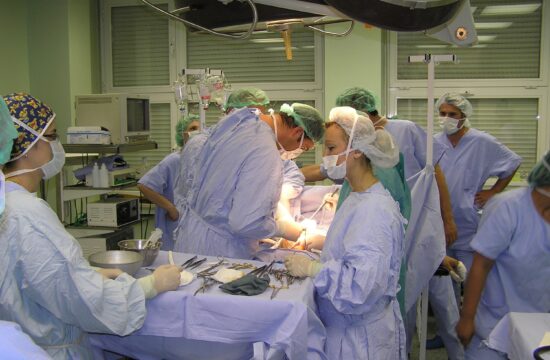
Marking the 25th anniversary of the peace agreement signed in Dayton, Ohio, the three members of Bosnia’s Presidency met with EU High Representative for Foreign Affairs and Security Policy and Vice-President of the European Commission, Josep Borrell, on Saturday to discuss the country’s EU integration prospects.
Borell arrived in Sarajevo on Friday and will also meet with various ministers and parliamentarians. He is expected to deliver a speech that will address the country’s path toward the EU and visit the War Childhood Museum in Sarajevo.
Milorad Dodik, the leader of the main Bosnian Serb party in the country, the Alliance of Independent Social Democrats (SNSD), Sefik Dzaferovic, a member of Bosnia’s strongest Bosniak party, the Party of Democratic Action (SDA), and Zeljko Komsic, the leader of the centre-left Democratic Front (DF), comprise the country’s presidency that was established by the peace agreement that ended the war, signed on November 21, 1995.
Borrell said that he had a “frank and open conversation” with the three about the current situation and the future prospect of Bosnia on its way towards the European Union.
“This is a very historic and important day for Bosnia and Herzegovina, and also for Europe,” he said.
“Today’s we are marking the 25th anniversary of the Dayton Peace Agreement and it is a good moment for reflection about what happened, about the atrocities of the past, to commemorate the victims, and to pay tribute to the many who have worked and continue to work hard on reconciliation,” he said.
The EU High Representative welcomed the joint statement the three Presidency members issued to mark the anniversary, adding that it recognized “the importance of strengthening trust, peace and mutual respect among all citizens in Bosnia and Herzegovina, as well as the need to respect all civilian victims of war.”
“We have to commemorate the past, but also look into the future,” Borrell said, reaffirming the EU’s support for Bosnia’s efforts to join the EU.
“Candidate status can be considered only when progress is made on all 14 key Opinion priorities expressed by the European Commission, and I underlined the importance of concrete progress in line with these priorities,” he said, referring to the set of priorities the European Commission defined for Bosnia to tackle in its efforts to receive candidate status.
Dzaferovic said that “today is an important day for us here in Bosnia and Herzegovina, and I would also say in Europe and the world.”
“Today we mark the 25th anniversary of the establishment of peace in Bosnia and Herzegovina,” the Bosniak Presidency member said, thanking Borrell for visiting the country.
Many topics were discussed at the meeting, but most of all Bosnia’s perspective in joining the EU, he said.
“We have Borrell’s support. It is up to us here in Bosnia to analyse our priorities. I hope that we will, after Borrell’s visit today, overcome another bad political climate and that we will turn more towards working and implementing all 14 recommendations,” he said.
Komsic also thanked Borrell for coming, explaining that “this was not only a protocol visit.”
“The European Commission and the EU stand behind the progress of Bosnia, providing the necessary assistance in the current situations and in general when it comes to Bosnia’s path towards the EU,” he said.
The Serb member of the Presidency, Milorad Dodik, who now chairs the institution, pointed out that Bosnia “does not have any ethnicity-based conflict for years.”
He noted that 25 years after the agreement was signed, the three ethnic groups living in Bosnia have different interpretations of the agreement.
“The Dayton Agreement said that Bosnia and Herzegovina was put together from two entities and three constituent peoples and that is the basis for future agreements in Bosnia,” he said, emphasizing the way the Bosnian Serbs see it.
“We asked for Bosnia to receive candidate status within the next year and that would be the new dynamic which would provide new circumstances. We are thankful to the EU for helping us in regard to the pandemic,” Dodik said.
The Bosnian Serb leader said that Bosnia needs a new package of financial assistance to help the country overcome the challenges of the pandemic.
“The biggest problem that can cause many political problems in Bosnia is the crisis of the pandemic that has caused economic consequences. If the economic consequences are not addressed in the right way, they will multiply into political differences which we will find difficult to stop here,” he said.
Candidate status can be considered only when progress is made on all 14 key Opinion priorities expressed by the European Commission, and I underlined the importance of concrete progress in line with these priorities.






